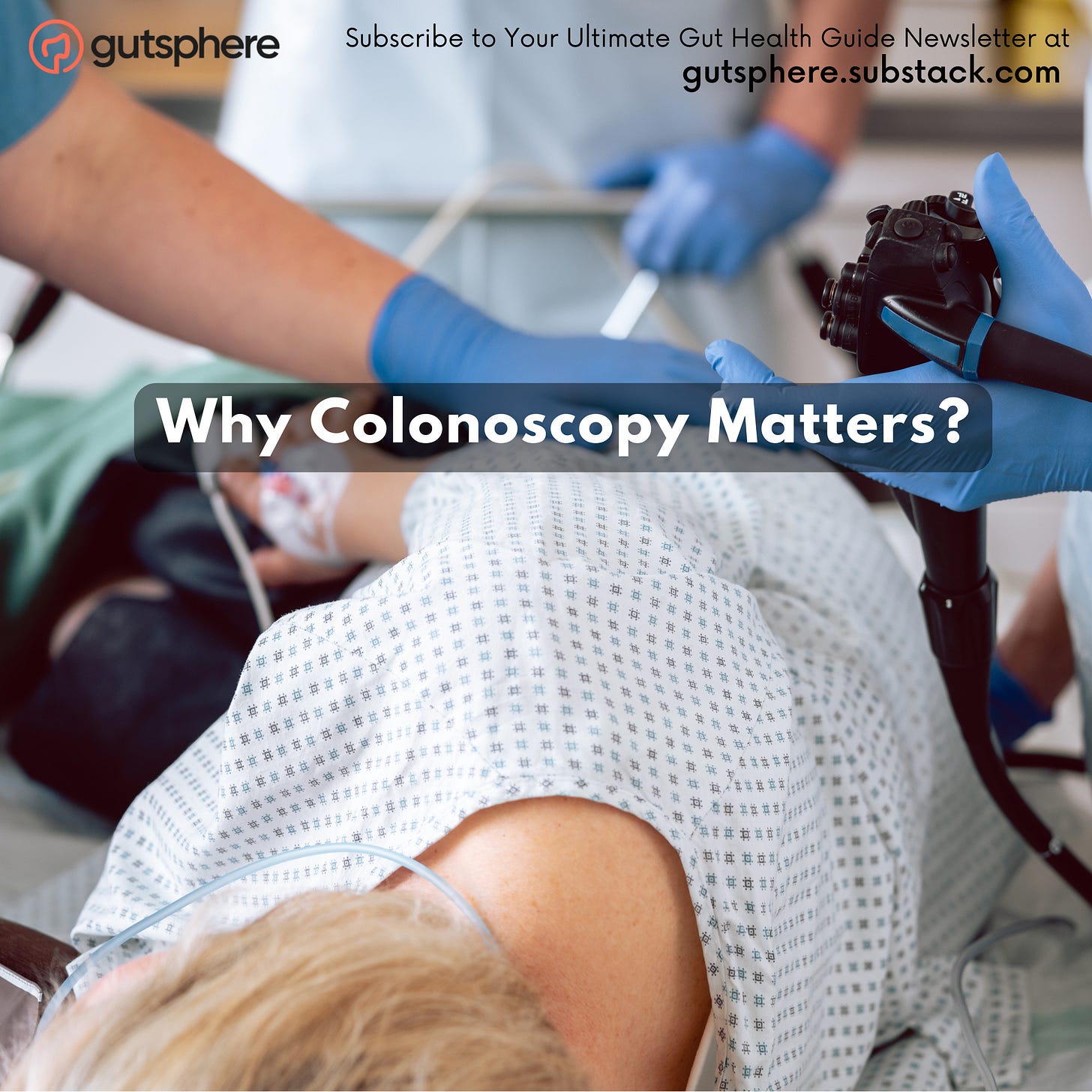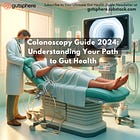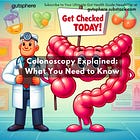Why Colonoscopy Matters ? Part (1/10)
The significance of colonoscopies in the early detection and prevention of colorectal cancer
Previous
Welcome, Gutsphere Friends,
In this special edition, we embark on a detailed exploration of colonoscopy, a procedure that stands as a guardian in the prevention of colorectal cancer. With a focus on evidence-based insights and empathy, we aim to empower our community with knowledge, dispelling myths and highlighting the importance of this lifesaving screening. Let's dive into the what, why, and how of colonoscopy, ensuring you're equipped with all you need to make informed health decisions.
Why Colonoscopy Matters
Colorectal cancer is a leading cause of cancer-related deaths worldwide, yet it's highly preventable with early detection. Colonoscopy is the gold standard for colorectal cancer screening, offering a unique advantage: not only can it detect cancer early, but it also prevents cancer by allowing for the removal of precancerous polyps. Studies, including those cited by the American Cancer Society, demonstrate that colonoscopy screenings can significantly reduce the mortality rate of colorectal cancer.
Understanding Colonoscopy
A colonoscopy is a procedure used to examine the inner lining of your large intestine (colon and rectum). Utilizing a thin, flexible tube called a colonoscope, equipped with a tiny video camera at the tip, doctors can view the entire colon and rectum. If necessary, polyps or other types of abnormal tissue can be removed during the procedure, and samples can be taken for biopsy.
The Procedure: How It Works
The process involves preparation that clears the colon, the use of sedation to ensure comfort, and the insertion of the colonoscope through the rectum to examine the colon. The procedure typically lasts about 30 to 60 minutes, with patients spending a few hours in recovery due to the sedative effects.
Who Should Get It
Screening guidelines recommend that individuals at average risk of colorectal cancer start regular screenings at age 45. Those with a family history of colorectal cancer or other risk factors may need to begin screening earlier and may require screenings more frequently.
Where to Get It
Colonoscopies are performed in hospitals, outpatient centers, and specialized clinics. It's important to choose a facility and a healthcare provider experienced in performing colonoscopies. Referrals from primary care physicians or recommendations from trusted healthcare networks can guide you to reputable providers.
How Often to Get It
For most people at average risk, a colonoscopy is recommended every 10 years if no polyps are found. If polyps are detected, the frequency may increase based on the number, size, and type of polyps. Individuals with higher risk factors may need to undergo screenings more frequently.
Cost Considerations
The cost of a colonoscopy can vary widely depending on geographic location, facility, and insurance coverage. In many cases, health insurance plans cover colorectal cancer screening tests, including colonoscopies, as preventive care. However, it's crucial to check with your insurance provider for specific coverage details.
Myths and Facts
Myth: Colonoscopies are painful.
Fact: Sedation is used during the procedure, making it painless for most people.
Myth: Colonoscopy preparation is unbearable.
Fact: While preparation involves a clear-liquid diet and laxatives, improvements in prep solutions make the process more tolerable than in the past.
Myth: Only older adults need colonoscopies.
Fact: Screening is recommended starting at age 45 for individuals at average risk, with earlier screenings for those at higher risk.
Safety and Efficacy
Colonoscopies are generally safe, with complications being rare. The risk of serious complications, such as perforation of the colon or reaction to sedation, is very low. The effectiveness of colonoscopies in detecting early-stage colorectal cancer and precancerous polyps makes it a critical tool in cancer prevention.
Empowering Your Decision
Understanding the significance of colonoscopy, how it's performed, and addressing common concerns is vital in making an informed decision about your health. By demystifying the process and highlighting its benefits, we hope to encourage our community to take proactive steps in colorectal cancer prevention.
In Closing
As we conclude this comprehensive guide, remember that a colonoscopy is more than just a medical procedure; it's a proactive measure to protect your health and well-being. By staying informed and making educated decisions about screenings, we can work together towards a future where colorectal cancer is detected early and prevented whenever possible.
Next
Request
Share
Our sincere request to you is to share the newsletter with your friends, family, and community so that they can benefit from the content. Also it will help us grow the newsletter, and eventually, as we release more content, digital tools, and more we will enable people around the world to live chronic disease free.
Subscribe
Feedback
Also, please give us feedback so that we can improve the content. And if there are any topics that you want us to cover please send us your questions and topics. Furthermore, if you try any of the things we provided information please share your experience with us.
Thank You
GutSphere Team
Disclaimer
Please note that the information provided in this newsletter is for informational purposes only and should not be considered as a substitute for professional medical advice, diagnosis, or treatment. If you have any concerns or questions about our health, please consult with a licensed healthcare professional. The information contained in this newsletter is not intended to diagnose, treat, cure, or prevent any disease. The publisher and authors of this newsletter assume no responsibility for any adverse effects that may result from the use of the information contained herein.





